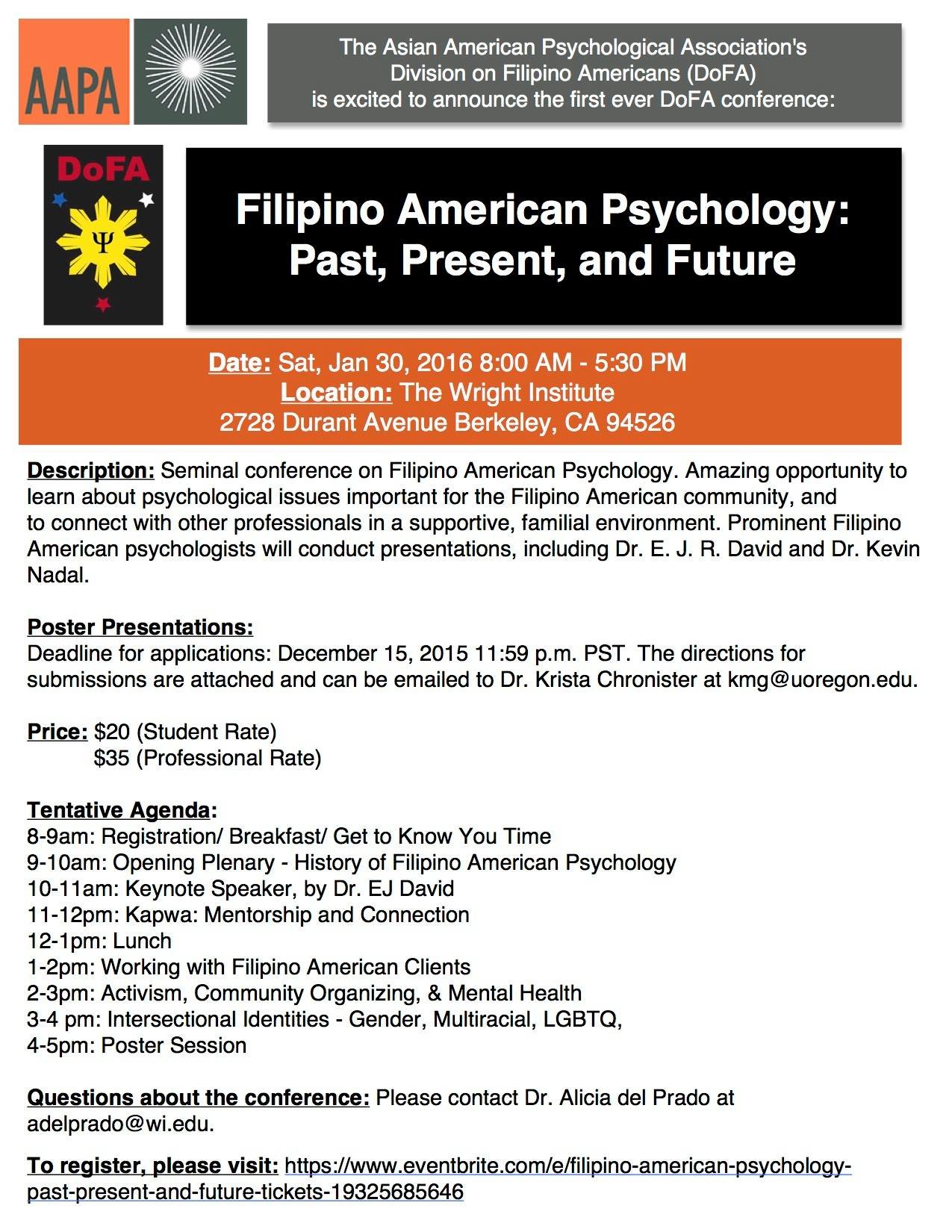The Asian American Journal of Psychology (AAJP) Editorial Board is pleased to share the contents of the September 2015 issue. The Feature Article for this issue is Racial Identity Profiles of Asian‐White Biracial Young Adults: Testing a Theoretical Model With Cultural and Psychological Correlates.
Dr. Chong was interviewed by AAPA and Division on Students member, Chak Wong. Learn more about Dr. Chong and the inspiration for this study below. You can also peruse the rest of the issue’s Table of Contents.
Q & A with Dr. Vanessa Chong

Dr. Vanessa Chong
General Background:
Dr. Vanessa Chong, PhD grew up in Calgary, Alberta, Canada, and attended graduate school for Clinical Psychology at the University of Windsor in Windsor, Ontario, where she became interested in cross-cultural research. Particularly, her master’s thesis explored the perceived acculturation discrepancies between Asian-Canadian young adults and their parents how family variables correlated with psychological adjustment. Her Asian-White biracial Canadian identity sparked further exploration of the extent to which Asian-White biracial experiences are similar and different from monoracial Asian individuals. In collaboration with her supervisor, Dr. Ben Kuo PhD, a full professor at the University of Windsor, her doctoral research (a portion of which was recently published in the AAJP) utilized a mixed methods study to investigate the interrelationships between biracial identity, family variables, psychological adjustment, and internalized oppression. Currently, she is working as a Clinical Psychologist in a community mental health clinic in Calgary.
How did you become interested in this topic?
Psychology researchers are known for studying themselves, and I was no exception! I primarily became interested in this topic due to my own experiences with growing up as a biracial individual. Although interracial marriages and biracial children are becoming increasingly common, when I was growing up, my sister and I were the only biracial kids in our school. Being biracial truly shaped our growing up years. I can vividly remember an encounter when I was about 6 when my sister and I were in a mall and a homeless man insisted on giving us each $5 “for the children of Vietnam.” He had assumed that our White mother must have adopted us because we didn’t look like her! I have always been curious about whether other biracial people had similar experiences.
Can you tell us a little bit about your current line of research?
In my current work I am primarily a clinician, but I believe that an important part of being a good Psychologist is applying research to clinical practice. I have been fortunate to have the opportunity to work with a number of clients from various ethnic backgrounds, including some biracial clients. I think it is especially important to discuss and normalize the biracial identity development process in therapy, as it can sometimes be complicated and challenging. There are some experiences that are unique to biracial individuals and should be discussed in therapy,. Coming to terms with one’s racial identity is a therapy goal that can be overlooked. In addition, my research looks at internalized oppression. I find it interesting that this is a relatively common experience among both monoracial minorities and biracial individuals, yet there is relatively little research on this topic. What’s more, it is a topic that clients may not bring up in therapy, as they may have shame associated with it. In the future, I may consider publishing some really interesting qualitative data on internalized oppression from my dissertation.
Any interesting tidbits you would like to share?
My research on Asian-White biracial individuals has been a really personally meaningful endeavor. I was able to collect a large amount of data from a fairly large sample (330 participants) from all over the US and Canada in a span of only three months. My participants were eager to answer questions about their experiences, and I actually received several messages thanking me for doing this research. I think this is because biracial people are so rarely studied and a common experience for biracial people involves feeling overlooked and not included. I feel honored that I was able to give them a voice through my research. In doing this research, I also felt increasingly connected to a community of people that I didn’t even know I was part of! This research helped me in my own journey of biracial identity development and, because of that, it will always hold a special place in my heart.
(Interview by Chak Wong, AAPA and Division on Students Member)
ASIAN AMERICAN JOURNAL OF PSYCHOLOGY
Table of Contents – June 2015
Feature Article: Racial Identity Profiles of Asian‐White Biracial Young Adults: Testing a Theoretical Model With Cultural and Psychological Correlates
Vanessa Chong and Ben C.H. Kuo
Moderating Effects of Perceived Language Discrimination on Mental Health Outcomes Among Chinese International Students
Meifen Wei; Ya-Shu Liang; Yi Du; Raquel Botello and Chun-I Li
Asian Values, Personal and Family Perfectionism, and Mental Health Among Asian Indians in the United States
Bindu Methikalam; Kenneth T. Wang; Robert B. Slaney and Jeffrey G. Yeung
Maternal Meta‐Emotion and Child Socio‐Emotional Functioning In Immigrant Indian and White American Families
Suchi S. Daga; Vaishali V. Raval and Stacey P. Raj
Asian American Phenotypicality and Experiences of Psychological Distress: More Than Meets the Eyes
Matthew Lee and Christina J. Thai
Changes in Academic Aspirations and Expectations Among Asian American Adolescents
Lisa Kiang; Melissa Witkow; Laura Gonzalez; Gabriela Stein and Kandace Andrews
The Sociocultural Context of Caregiving Experiences for Vietnamese Dementia Family Caregivers
Oanh L. Meyer; Kim Hanh Nguyen; To Nhu Dao; Phuoc Vu; Patricia Arean and Ladson Hinton
Pathways Among Asian Americans’ Family Ethnic Socialization, Ethnic Identity, and Psychological Well‐Being: A Multigroup Mediation Model
Chi P. Nguyen; Y. Joel Wong; Linda Juang and Irene J.K. Park
A Long‐Term Therapeutic Journey With an Asian “Parachute Kid”
Teresa A. Mok
Book Review: Brown Skin, White Minds: Filipino‐American Postcolonial Psychology
Gauthamie Poolokasingham











